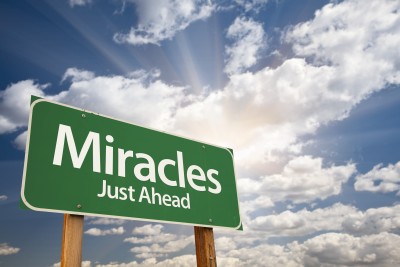The miracle behind miracles is that they bring light into our lives when we are in our darkest moments. We all have different definitions of “dark” moments, just as we all have different challenges to overcome. For some, a dark moment could be the disappointment of a breakup, and for others, a dark moment is being handed a medical death sentence with an incurable form of cancer.
The one thing these moments all have in common is that they bring us to our knees. In many cases, it seems that we have no control over the outcomes when these tragedies hit. But I would argue that this is exactly the moment when we have all the control in the world. Because it’s how we deal with the dark moments and challenges that defines who we are as humans.
I don’t think anyone would disagree that our dark moments bring us to the brink of what we can handle from an emotional point of view. And that’s where I would argue that we should embrace these moments because they show us how strong we truly are—and when we fight our way back into the light, the feeling is almost euphoric because of how far we had to come. To overcome these tragedies is what allows us to bask in the warm embrace of the miracle that got us there.
The Oxford dictionary defines a miracle as “an extraordinary and welcome event that is not explicable by natural or scientific laws and is therefore attributed to a divine agency.” With no expectation or reason, those tragic dark moments change in the most powerful way and are blasted away with the bright light of a miracle.
There are few things more satisfying than hearing or reading stories about incredible people who overcame incredible odds to create their own miracle of success, where the light snuffs out the darkness.
One such story is that of Lareece Butler who survived a 3,000-foot free fall. Lareece was skydiving when her parachute’s ropes started to tangle around her and she started to plummet toward the ground at 9.8 meters per second, per second (exponentially). She miraculously only suffered a broken leg, a fractured pelvis, and a concussion when she should have died an unimaginable death. “It was nothing but divine intervention, nothing short of a miracle,” her doctor was quoted as saying.
The second miracle story is of Joseph Rick. Joseph had finally accepted his terminal cancer diagnosis after 15 months with the disease—and after receiving endless chemotherapy, radiation and nine surgeries. His cancer continued to progress, and as a last-ditch effort, he signed on for a clinical trial of an experimental therapy. Joseph called that clinical trial a gift from G-d, because within a month, the tumors on his skin had shrunk to nothing.
Miracles can happen in split moments, such as in the case in our third miracle of Donnie Register of Morton, Mississippi. Donnie was helping two customers in his antiques store when one of them aimed a gun up to his head. Just as the robber went to shoot, Donnie threw his hands up and his gold wedding band deflected the killer shot. “I don’t know if I was just lucky or if I had other help,” Donnie says, “but it was wonderful either way.”
These stories are testament of the various types of miracles that happen all over the world daily, shining light in to many of our lives. As I lit the candles this Hanukah with my family, I thought about the miracle of the oil that lasted for eight nights, but I also thought about how miracles bring in the brightest light.



